Civic Tech Field Guide
Sharing knowledge and productively growing the fieldSearch Results - Data (2597)
Showing 2597 Results
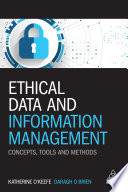
Information and how we manage, process and govern it is becoming increasingly important as organizations ride the wave of the big data revolution. Ethical Data and Information Management offers a practical guide for people in organizations who are tasked with implementing information management projects. It sets out, in a clear and structured way, the fundamentals of ethics, and provides practical and pragmatic methods for organizations to embed ethical principles and practices into their management and governance of information. Written by global experts in the field, Ethical Data and Information Management is an important book addressing a topic high on the information management agenda. Key coverage includes how to build ethical checks and balances into data governance decision making; using quality management methods to assess and evaluate the ethical nature of processing during design; change methods to communicate ethical values; how to avoid common problems that affect ethical action; and how to make the business case for ethical behaviours.

This book provides a concise and usable overview of the practical implications of important public sector United States federal, state, and municipal laws and standards related to information governance, as they pertain to librarians, research staff, universities, corporate regulatory managers, and public-sector information governance professionals. It is the first in a series of two volumes addressing public sector information governance compliance matters from the perspective of our target audience. Topics addressed in the book include: the evolving role of librarians and the need for librarians and legal researchers to understand the principles of information governance, the importance of broad-based regulatory IG principles such as the Federal Records Act, the Paperwork Reduction Act of 1980 and 36 CFR Chapter XII, Subchapter B – Records Management, that have been promulgated by various federal government agencies in framing public-sector IG principles, a survey of interpretive surveys from the Office of Management and Budget (OMB) that further elucidate the core IG principles applicable to public sector stakeholders, case studies detailing the application of important IG principles by federal agencies and bodies, and a survey of important IG issues facing state and local governments.

The Committee on National Statistics of the National Academies of Sciences, Engineering, and Medicine convened a 2-day public workshop from December 11-12, 2019, to discuss the suite of data products the Census Bureau will generate from the ...

It provides this by providing links to current research, examples from the field, and expert input. It is intended to serve as a supplement to the User's Guide.

Open Data Toolkit for Cities
153a Helen Joseph Road, Congela, Durban, South Africa(with National Treasury)

South African Cities Open Data Almanac
153a Helen Joseph Road, Congela, Durban, South Africa(with SA Cities Network)

Disability Data Standard
Boston, MAWe want to develop a standard approach to collecting data about disability from constituents and City employees to improve accessibility and inclusion in Boston.

Ask Data Israel (יצירה וצפייה בבקשות)
Israel (Jisra'el)Inactive Alaveteli instance for Israel

The AAPI Nonprofit Database
United States of America (the)The AAPI Nonprofit Database is an interactive resource to find and connect with AAPI organizations

Our report, “A Fourth Wave of Open Data? Exploring the Spectrum of Scenarios for Open Data and Generative AI,” (May 2024) provides a new framework and recommendations to support open data providers and other interested parties in making open data “ready” for generative AI.

ICTs in Elections Database
Sweden (Sverige)In order to help election practitioners and stakeholders to better understand the use of ICTs in elections, International IDEA has conducted a global comparative study to learn how ICTs are being used in several stages of electoral process.

AI Intersections Database
Mozilla, East Evelyn Avenue, Mountain View, CA, USAThis database by Mozilla Foundation maps intersections between the key social justice and human rights areas of our time and documented AI impacts and their manifestations in society.

CoreData.nyc is New York City’s housing and neighborhoods data hub, presented by the NYU Furman Center.

Climate Data Joint Learning Network
United Nations FoundationThe Climate Data JLN will surface key data governance innovations that will enable climate-relevant data to be more accessible and useful for frontline governments and communities.

Africa Data Leadership Initiative
United Nations FoundationThe Africa Data Leadership Initiative (ADLI) is a peer learning and exchange network designed by and for African policymakers, legislators, researchers, technologists, and digital rights advocates working on data governance and digital platforms and services.
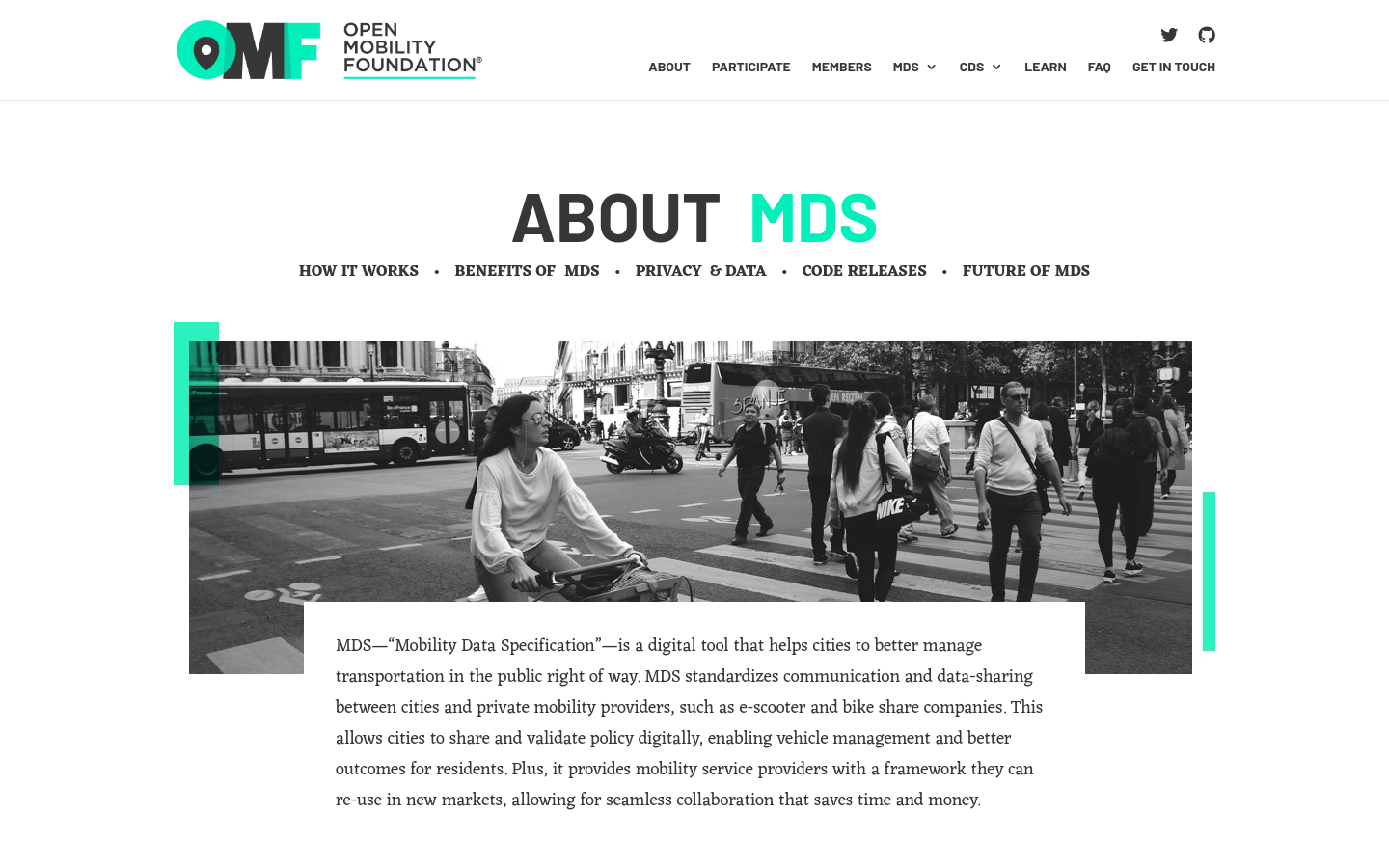
Mobility Data Specification (MDS)
United States of America (the)MDS standardizes communication and data-sharing between cities and private mobility providers, such as e-scooter and bike-share companies.

Social Impact Chatbot Database
San Diego, CAWe have collected over 40 chatbot projects by nonprofits and social businesses around the world that help build a more just, equal and sustainable future.

The State of Open Humanitarian Data 2024
Humanity Hub, Fluwelen Burgwal, The Hague, NetherlandsA ten-year anniversary retrospective on the Humanitarian Data Exchange, which was accessed by 1.4 million people in 230 countries to download 2.7 million open humanitarian datasets in 2023.

Camden Talks Data: Machine learning
Camden Town, LondonThis video explains how Camden Council uses machine learning to improve council services.

The Planning London Datahub
LondonThe Planning DataHub is a collaborative project between all of the Planning Authorities in London to build a single open data set of development proposals in the planning process to enable monitoring of how our City is changing and develop a shared understanding of the data.
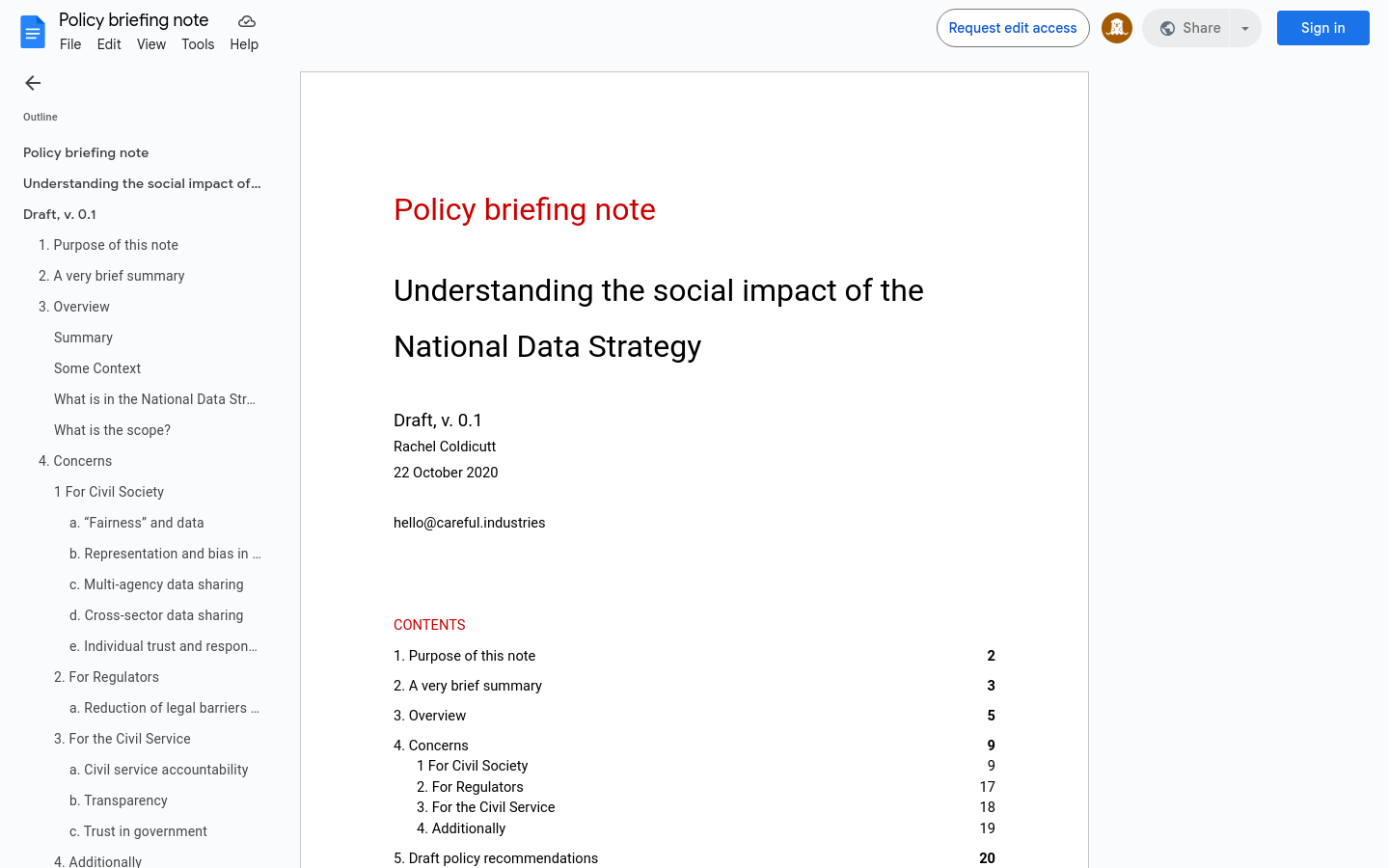
Understanding the social impact of the National Data Strategy
United Kingdom of Great Britain and Northern Ireland (the)A policy note to make it easier for more people to engage with the UK government's National Data Strategy.

Open Council Data
United Kingdom of Great Britain and Northern Ireland (the)All UK councillors 2016-2023 + by-election info

Trust and accountability patterns in digital government: data usage trackers
United Kingdom of Great Britain and Northern Ireland (the)In a new series of blogs, Richard Pope looks at concrete examples of digital transparency, accountability and recourse from around the world.

Open Data Maturity Scale
Washington, DCLearn about different possible open data interventions, based on level of feasibility and impact

Community Data Dialogues
Washington, DCLearn how to host events to engage non-technical audiences on open data

Collaborative Data Patterns
Open Data Institute, 3rd Floor, 65 Clifton Street, London, EC2A 4JEThis guidebook helps people design and run projects that involve the collaborative maintenance of data

Wikidata search tool for Venezuelan works in public domain
Bolivarian Republic of VenezuelaAn automated query in Wikidata of all existing profiles of Venezuelan authors, scientists and creators whose works are in the public domain according to national and international laws by virtue of the time elapsed since their death.
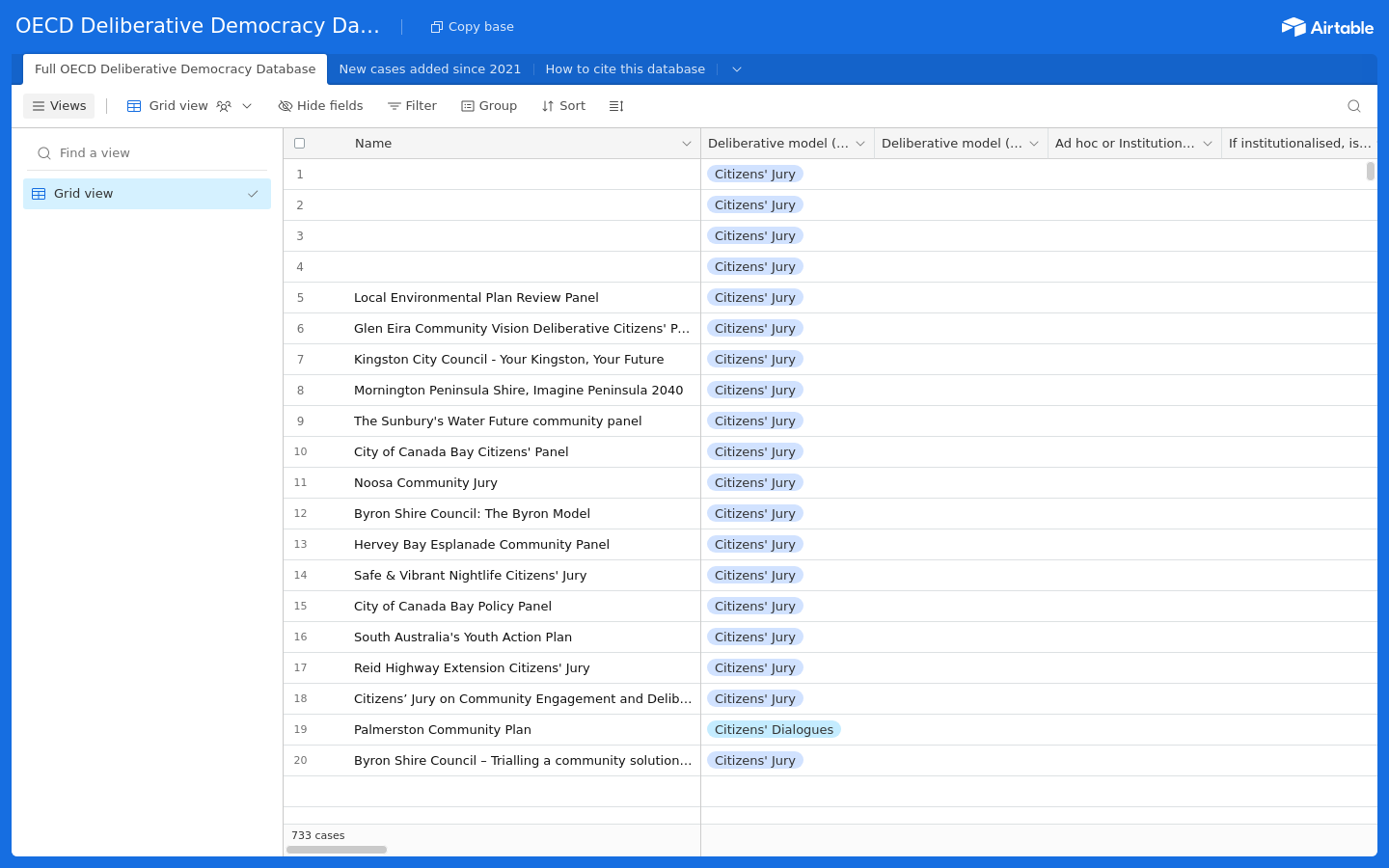
OECD Deliberative Democracy Database (2023)
OECD, Rue André Pascal, Paris, FranceThe OECD's 700+ case studies of citizen juries, councils, assemblies, and more
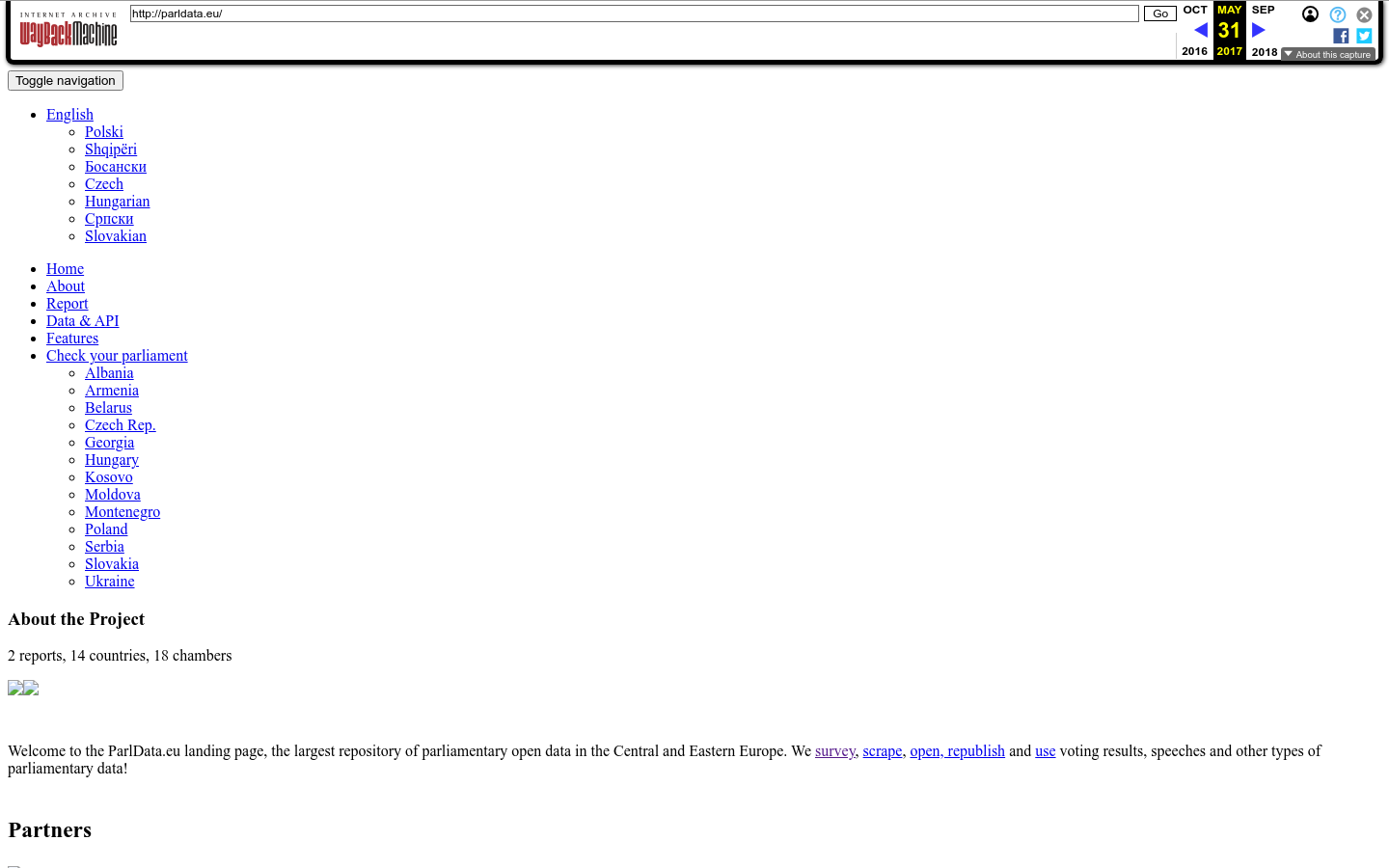
Parldata.eu
Czech Republic (Ceska Republika)[T]he largest repository of parliamentary open data in the Central and Eastern Europe. We survey, scrape, open, republish and use voting results, speeches and other types of parliamentary data!

Academic analysis of open data on Github finds it's "one of the largest hosts of open data in the world and has experienced an accelerated growth of open data assets over the past four years."

Water Data Explorer
LondonThe Water Data Explorer was developed by the British Geological Survey in collaboration with Imperial College London, The University of Oxford and UCL as part of the CAMELLIA project, and in partnership with a broad range of stakeholders. CAMELLIA has been funded by the UKRI's Natural Environment Research Council (NERC).

Transparency & Accountability Initiative Grants Database
1100 13th Street NW Suite 800 Washington, D.C. 20005Includes funding from Ford, Hewlett, Luminate, MacArthur, OpenSocietyFoundation, and Chandler foundations totaling over half a billion dollars

Kosovo Data Governance Academy
Prishtina, KosovoSummer open data training and materials piloted in 2023

Progressive Data Jobs
United States of America (the)What is a “progressive data” job? Loosely defined as a job where the majority of the role, department, or organization is focused on data or analytics work in the progressive space. This work may include anything from data science and software engineering to sales and staff management.














